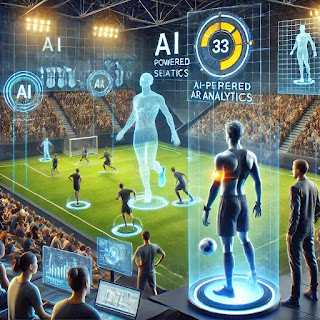AI in Sports: Transforming Performance and Fan Experience
Introduction
Artificial intelligence is revolutionizing the sports industry, from enhancing athlete performance to reshaping how fans engage with their favorite teams. Whether it's AI-powered analytics, smart coaching tools, or immersive fan experiences, technology is changing the game. In this post, we’ll explore how AI is transforming sports, including a fascinating case of AI-driven performance optimization.
The Story: AI Helps Athletes Train Smarter
One of the most groundbreaking applications of AI in sports is its role in training and injury prevention. In 2022, the AI-powered platform Zone7 helped professional soccer teams predict and prevent injuries. By analyzing biometric data, player workload, and game statistics, the system flagged potential risks, allowing teams to adjust training regimens accordingly.
During one season, a European soccer club using Zone7 saw a 50% reduction in injuries, improving player availability and overall team performance. This success highlights how AI is not only optimizing athletic performance but also extending careers and enhancing player well-being.
Why This Matters
AI is making a significant impact in various aspects of sports:
- Performance Analytics: AI analyzes player movements, game strategies, and opponent behaviors to optimize performance.
- Injury Prevention: Predictive analytics help teams reduce injuries and manage player fitness effectively.
- Fan Engagement: AI-driven chatbots, real-time statistics, and immersive AR/VR experiences enhance how fans interact with sports.
These advancements are creating new opportunities for both athletes and audiences, making sports more data-driven and engaging.
Challenges and Ethical Considerations
Despite its benefits, AI in sports also presents challenges:
- Privacy Concerns: The collection of biometric and personal data raises ethical questions about athlete privacy.
- Reliance on Technology: Over-dependence on AI tools may undermine traditional coaching instincts and decision-making.
- Data Bias: AI models trained on limited data could introduce biases in talent scouting and game analysis.
Addressing these issues is crucial to ensuring AI enhances sports without compromising fairness and human intuition.
The Future of AI in Sports
Looking ahead, AI will continue to redefine the sports industry. Future developments may include real-time AI-generated game strategies, AI-assisted referees for more accurate officiating, and even personalized fan experiences powered by AI-driven storytelling.
Imagine a world where AI tailors game highlights based on individual fan preferences, or where smart wearables provide instant feedback to athletes during competition. The possibilities are endless.
Takeaway
AI is revolutionizing sports, improving performance, safety, and fan engagement. While challenges exist, the potential benefits far outweigh the risks, making AI an integral part of the future of sports.
Call to Action:
How do you feel about AI’s growing role in sports? Do you think it enhances the game or takes away from the human element? Share your thoughts in the comments below!
